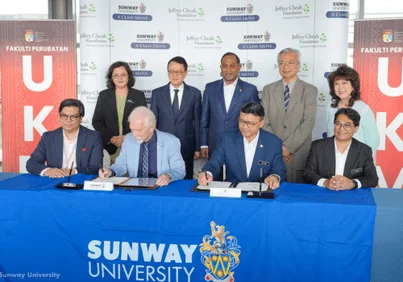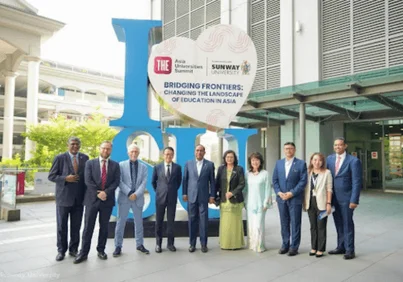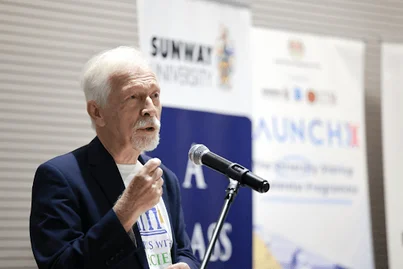
BA (Hons) Design

Course overview
| Qualification | Bachelor's Degree |
| Study mode | Full-time |
| Duration | 3 years |
| Intakes | September |
| Tuition (Local students) | RM 165,522 |
| Tuition (Foreign students) | RM 353,591 |
Admissions
Intakes
Fees
Tuition
- RM 165,522
- Local students
- RM 353,591
- Foreign students
Estimated cost as reported by the Institution.
Application
- Data not available
- Local students
- Data not available
- Foreign students
Student Visa
- Data not available
- Foreign students
Every effort has been made to ensure that information contained in this website is correct. Changes to any aspects of the programmes may be made from time to time due to unforeseeable circumstances beyond our control and the Institution and EasyUni reserve the right to make amendments to any information contained in this website without prior notice. The Institution and EasyUni accept no liability for any loss or damage arising from any use or misuse of or reliance on any information contained in this website.
Entry Requirements
- A-level: ABB
- BTEC: DDM
- IB: 33 points including three HL subjects
English Language Requirements
- IELTS - 6.5 (with a minimum of 6.5 in the written element and no individual element lower than 6.0)
Curriculum
The three-year degree is structured around five different modules:
Studio Practice
This module is where the majority of the practical, project-based work is delivered, discussed and assessed. Studio Practice is delivered through a series of unique structured briefs in Years 1 and 2, and progresses into Year 3 with the development of a student-led major project and exhibition.
Contextual Studies
Contextual Studies provides the theoretical core of the BA Design. You will attend lectures on a wide range of design-related issues, ranging from ethics and sustainability, to semiotics and psychology. In the final year this module supports the writing of the Context Report (dissertation).
Technical Studies
A series of technical workshops, delivered to first and second years, covering a broad base of skills. You encounter traditional 3D materials and technologies, and advanced computer-aided design and manufacturing. Technical workshops also cover image production, manipulation and film making, as well as fundamental aspects of typography and graphic layout.
Methods and Processes
In Year 1 this module equips you with a set of tools for designing, looking at research methods and ways to generate and record ideas. In Year 2 the module prepares you for workplace environments, introducing aspects of professional presentation and communication.
Professional Practice
All students undertake a Professional Placement between Years 2 and 3. This module encourages you to develop a more professional approach to your own work, and to generate valuable contacts for future employment.
These modules support and complement one another within each year of study, and as you progress through the years they are designed to build a coherent set of experiences.
YEAR 1
Studio Practice
Studio projects are formulated to allow you to develop your own ways of thinking. You will be challenged to push your ideas, and given space and support to develop an understanding of artefact, user, site and situation.
Contextual Studies
- Histories and Theories – lectures, visits and practical exercises on the historical and theoretical context of design in the 20th century unravel the main theoretical influences on design and designing.
- Design and Meaning – lectures and practical exercises looking at the roles that psychology and semiotics play in design. You'll examine the complex nature of design thinking and creative techniques, and the ways in which these relate to actual practice. You'll also be encouraged to explore your own personal responses to the design process.
- Ecology and Design – you'll explore relationships between nature, culture, industry and other social systems, while highlighting possibilities for change in response to current environmental and cultural issues. The context for this module is the emerging field of Eco Design. It is broad-based to give an overview of key issues and ideas.
Methods and Processes
Concentrating on the techniques and processes in research, modeling and drawing.
Technical Studies
These workshops focus on specific areas within the discipline. They'll give both a critical and technical introduction into areas such as making, still image, graphic communication and textiles.
YEAR 2
Studio Practice
You'll explore ways that the contemporary designer can negotiate a changing social, cultural, ecological and political terrain. You'll be encouraged to adopt a personal, ethical and ideological stance in tackling projects concerning the social, cultural, environmental and political domain.
In the spring term you'll work on ‘industry-based projects’, the briefings for which come from the commercial sector. These projects allow you to present to design professionals, gaining valuable experience and insight. The projects are set by a broad range of design professional and commercial sectors, such as Imagination, Pentagram, Hive, Raw Nerve and Lewisham Council.
Contextual Studies
- Ethics and Sustainability – This lecture programme asks why the ethical stances of designers, the moral features of the design process, and the value-laden nature of various objects and images, are important in design. You'll also explore ideas relating to ecological understanding of design and culture towards a widening of perspective and engagement in contemporary ecological concerns.
- Society and Culture – Lectures and practical exercises investigate design in the context of society and culture. You'll examine a number of socio-cultural influences on designers, design processes and design outcomes, and will be encouraged to explore the ways in which your own designs are framed by these influences.
- Material Culture – Lectures and practical exercises investigate design in the context of what has become known as material culture. You explore various attitudes to cultural production, examine notions of consumption and taste, and investigate the various practices that have been built around these attitudes and notions. You will be encouraged to explore the ways in which your own designs are framed by material culture.
Methods and Processes – Professional Practice
This module asks you to engage in design as a professional practice. It opens up the extensive nature of the design industry, in order to increase your understanding of the role of a practicing designer.
Technical Studies
These sessions cover a range of skills, which build upon the previous year. We offer workshops such as interactive design, moving image, electronics, object manufacture, rapid prototyping/CAD and graphic communication.
Professional Practice
During the summer term you are expected to secure and undertake a placement of at least six weeks in duration. You are required at the beginning of Year 3 to submit an assessable presentation based on your work placement.
YEAR 3
Studio Practice
In the final year you develop your own projects, supported by an individual ‘mentor’. Workshops enable you to formulate, develop and realise a project. Major projects must have a strong conceptual underpinning and be well founded and reasoned.
The final stage of Year 3 is the presentation and exhibition of design practice project work. This is an important part of the educational experience – calling for teamwork, organisation, management and design, developing a range of skills critical to future careers.
Contextual Report
This major piece of writing presents the contextual and theoretical framework for your major project. This 6,000-word report develops alongside your project and is a personal piece of work.








